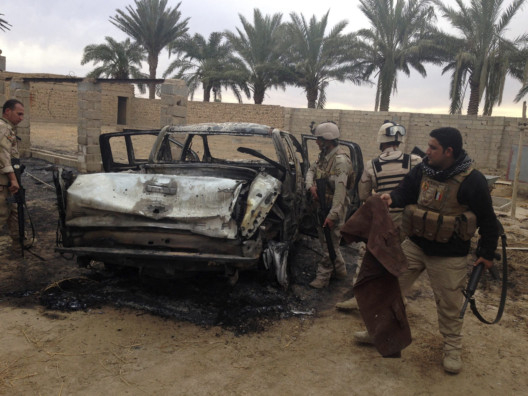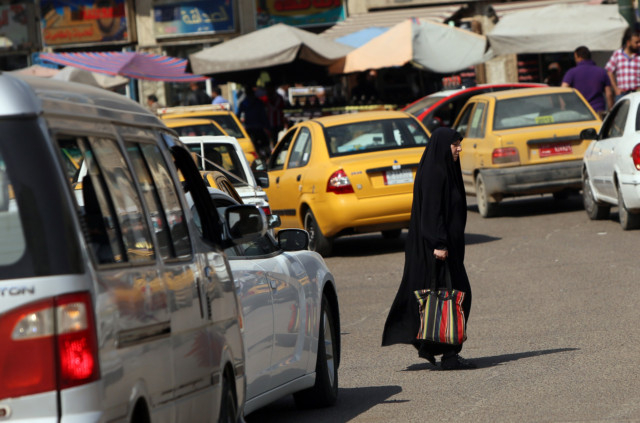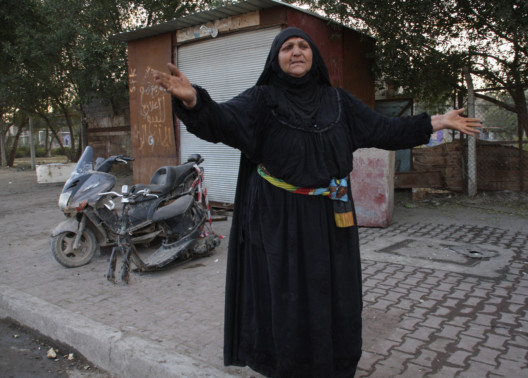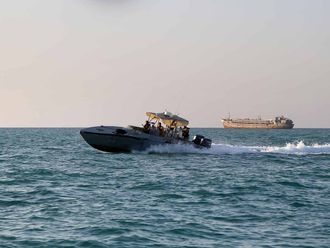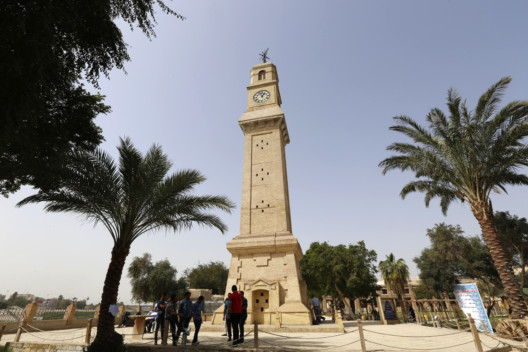
The e-mails from Baghdad popped up in the middle of my London workday. Friends, one-time drivers and translators, who had helped me navigate war-torn Iraq a decade ago, were responding to my New Year’s hello — and their words left me blinking, hard, at the computer.
“I won’t tell you how miserable life in Baghdad is these days. You’re watching the news and you know. It’s worse than ever,” wrote Nadeem Majeed, an engineer who once worked as a translator for the Chicago Tribune and now manages a Nissan distributorship. His district was rocked at Christmas by two big, deadly bomb blasts; his wife, parents and children, 3 and 5, stayed inside their home for days.
Sinan Adhem, a former officer in the Iraqi army, had been a Tribune driver who had reassured me through some very scary neighbourhoods in 2003 and 2004. Now, he pinged an alarming note. A UN security analyst for three years, he could see violence was spiralling. So he had applied for a new, safer assignment — to Syria. Syria? I wrote back quickly. How was Syria, wracked by civil war, anyone’s safe haven?
“The situation is getting worse and worse here and there is no sign that it will get better,” he typed. Moving to Syria for the UN would mean working in a secure compound while his wife and child lived in a nice home in Lebanon; they would be together during breaks. So “we will wait and see”, he wrote cheerily. “All my family says hello to you, my dear.”
Last year, I began reading press reports from Iraq with some unease. New battles — some stirred by militants coming over the border from Syria — were percolating just outside Baghdad in Anbar province, where the so-called surge of 2007, by American troops and Iraqi tribes, had quelled militant rage. Beheadings, shootings and car bombs had been mounting again since spring. Baghdad at first seemed shielded but then December came. A Christmas bombing, near a church in the southwest Doura district, killed two-dozen people as they left mass. The same day, a bomb in an open-air market left another 11 dead. Violence was swelling to levels not seen since 2008. How far could it go?
I sorted through my old e-mails. The men I had worked with then were now married, mostly in their 40s, all fathers. Were they living good lives? Were their sons and daughters growing up happy? In a year of fresh terror, was this new Iraq better than the old? We exchanged e-mails and phone calls and agreed there was a story — their story — we had never told. Ten years after we covered war in Iraq, could we gather to talk about life in Baghdad?
Just before I bought my ticket, I phoned Nadeem with a worry: should I wait until elections in April? “If you want to do this, now is better than later,” Nadeem said emphatically. “With elections, we will have even more attacks.” He laughed, a thin chuckle. “That is how democracy works here.”
My first steps back in Baghdad last month seemed appropriate. I was confused. I couldn’t find Sinan in the terminal. Airport security had been beefed up hours earlier and, even with a UN badge, Sinan was barred from passing the four armed checkpoints and dog searches leading to Baghdad International. We traded phone calls and a friend of Sinan’s appeared — he had a job with a higher security clearance — and we drove off in his sedan. Suddenly, there was Sinan waving from the roadside. Seeing him run to my window — beardless and burlier but still with the loping gait of a young man — made me laugh. Then we both choked on tears. Within seconds, he crammed into the back seat and began guiding me through a city I struggled to recognise.
The airport road was a wonder — a $10 million (Dh36.7 million) wonder, as Sinan wryly noted — of wide asphalt, imposing safety walls and multiple checkpoints that made a trek into the city centre a stop-go-slam-the-brakes-hit-the-gas-take-some-crazy-chances expedition. I peppered Sinan with questions as we jerked along in a conga line of traffic towards Jadriya Street. I had flown away from a capital with no working street lights, few road signs and a handful of dependable grocers. This Baghdad was teeming with car dealerships, burger joints and glass-fronted malls. I could hear the groan of generators on every street — electricity was a weak link after all these years? — but here was a city, with uneven success, working through or around some of its troubles. I had read that oil production was improving to three million barrels a day. I hadn’t realised how many investors from Turkey, Iran, Dubai and within Iraq had been signing deals, building apartments and hotels, and betting on a safe Iraq.
That is why the dangers of the past year were spooking my friends, the political elite here and the Obama White House, which began ferrying diplomats in January to meet Prime Minister Nouri Al Maleki to encourage a crackdown on violence. Iraq was never going to be a destination for the faint-hearted but Al Maleki appeared, to detractors in his own parliament and to many in the international community, to have played sectarian politics with some abandon in 2013. His disregard for promises, to Sunni and Shiite rivals, had helped open a valve of bloodshed.
Protests broke out in the western province of Anbar last year largely because Sunni tribes felt the prime minister, a Shiite, had ignored promises made after the surge. Tribal fighters who had helped rout Al Qaida in 2007 did not see state benefits — in pay or status — follow. Those protests turned into clashes in the city of Ramadi; foreign fighters from Syria seized on the turmoil and ran into nearby Fallujah by summer. Prison breaches in July and December freed militants to join the fray. Targeted killings by gunmen with silencers ticked up in autumn. By year’s end, bombs were ripping through the country and into Baghdad. In the first week of January, Al Qaida’s black flag was seen flying on trucks in Anbar.
As I planned my visit several weeks ago, government ministries came under fire. The transport ministry was sprayed by gunmen, with more than 12 people dying on January 30. On February 5, the foreign affairs ministry was fractured with a bomb; 16 people died and ten were injured. As we drove, Sinan said he had photos of the slain. Did I want to see them? Not really, I demurred, but I did want to know what he thought of security.
Well, there was no way to know when or where bombs could strike, he said. He went by taxi at 6.30am every day — two hours early for work — to enter the international zone, which also houses the massive United States embassy, to miss rush hour and bombs. But he saw no method to the madness. Some days, explosions rattled all corners of the city.
When I was last in Iraq, the bureau staff would sometimes grumble about my demands to tamp down risk. Not now. They arranged a room in a house for me, off a lane secured by armed guards. Outside the compound, I would wrap a scarf over my hair. We agreed: no big dinners in restaurants, no meetings at government offices. Travel would be with former staff, in their cars.
That afternoon, Nadeem and his brother Arfan walked into the house just as Sinan and I dropped my bags. We hugged and grinned. They were still handsome, with just a little less hair, and dapper in suit jackets. We chattered as we jumped in Nadeem’s car, flashed identity cards at the guys with guns at the checkpoint, and drove to a quiet outdoor café. Sitting under palm trees, we tucked into an early supper of lamb and planned.
Arfan would listen to early morning radio and check his laptop to judge the daily risk. “After a bombing, everyone goes home and traffic is bad. When there are simultaneous bombings, it is very bad,” he said. He and Nadeem, who both work for Nissan, would be working but moving around with multiple mobile phones, a laptop and chargers. Nadeem has WhatsApp on his phone as well as Facebook; he is constantly trading messages about safety with his wife and friends. “That is how everyone lives.”
“I never tell people when I will meet them,” Nadeem said. “I always tell them when I will leave. And then we calculate the roads, the time we need, how we will know if there’s a new checkpoint that comes up — I have an Iraqi app, ‘GoPhast’, for that too.”
When I awoke late the next morning, the day was bright. The news was sobering. Two bombs hidden in clothing stalls at a wholesale market in the Souq Al Arabi, in central Baghdad, had exploded simultaneously. Six people were killed, 18 injured. Later, the UN issued a statement: it was concerned about “rapidly deteriorating conditions” in Anbar.
So on my first evening in town, I would go east. To Sinan’s home in east Baghdad and to party with a 9-year-old.
Mariam Adhem wore a pink paper crown in her curly hair and giggled with six little girls in the family’s living room. A chocolate cake, topped with a sugary Dora the Explorer, sat at the centre of the dining table. My arrival added to Mariam’s excitement but her big surprise that night was a chemistry set from her parents. Her mother Hiba joked: “She may be our scientist.”
Sinan and Hiba were both funny and pensive as we watched the girls play. Sinan pointed out what was unusual: the family’s home was Mariam’s entire world. She learnt to rollerblade across the living room carpet. Her bike was stashed near her bed. The farthest she pedals in Baghdad is out into the tiny family car park shielded by a 10-foot wall. Her parents would not dream of letting Mariam walk or play in Baghdad’s streets. They fear kidnappings. Or drive-by shootings. Her school is 100 metres away: Mariam is driven to and from class. It is a routine many parents follow.
“This is what I worry about,” Sinan said. “When I grew up here, the street was my life. From home to school, that walk, that was how we learnt life. We biked, we played . . . It didn’t matter what religion you were. No one thought that way.”
Sinan’s neighbourhood, Zayouneh, is evidence of the changing times. Under Saddam Hussain’s dictatorship, neighbourhoods were arranged by occupation. Teachers lived in one area, engineers in another. Sinan’s father, a Sunni, was an army officer, so they lived on a choice street. When Sinan was a teenager, his father refused to attend Baath party meetings and was kicked out of the army. He lost the perks of retirement and the family sold part of the house to make ends meet.
Today, Sinan, his brother and sister still live there with their families, each on different floors. They know every turn in their neighbourhood; they just no longer know their neighbours.
Mosques there have changed from Sunni to Shiite in the past seven years. Shiite clerics showed up and “suggested it would be better”, Sinan said. When I raised an eyebrow, he chuckled. “‘Ooooh yes,’ the Sunnis said, ‘No problem, we go.’”
Two new Shiite mosques are being built 500 metres from his home; his newest neighbours are Shiites. Sinan shook his head when I asked if there were tensions. “No, really, the shaikhs here are moderate. They don’t want any trouble either.”
Hiba and I chatted about Iraqi schools. Hiba teaches at a public primary school. There is no heating, no air-conditioning, no running water. The conditions are not what she and Sinan enjoyed as children. For Mariam, they decided private schooling — which abounds now in Baghdad — was the only option. Hiba doesn’t complain about what the public schools lack or, for that matter, what the government doesn’t provide. She and Sinan — and nearly everyone I saw that week — just set their own standards.
A private diesel generator runs for hours a day when electricity fails. That is $230 a month. Sinan’s brother, a civil engineer, researched Baghdad’s water quality a few years ago and told his relatives it was unsafe. That is another $150 a month for bottled water. Private school tuition is about $100 a month. Such is the price of a middle-class life in Baghdad, Hiba and Sinan said. What they worry most about is the cost of violence on Mariam.
“My daughter needs to know the world,” Hiba said. Sinan chimed in: “She should be walking the streets, going on school outings ... That is how a child gains confidence.” And that is why Syria beckons. “You know, if I want a better life, I have to take a chance. And Syria is my chance,” Sinan said. “Mariam is developing an ear like radar. She hears the talk about car bombs and explosions and she listens more. She knows what is an IED [improved explosive device]. She hears the radio, she hears talk in school.
“I do not want my child growing up counting car bombs.”
It was a cool sunny morning, a pleasant day to reminisce. Eight former staffers had just walked out of my memory and into my garden. As I shook their hands, I realised their big smiles were not for me alone. They were grinning and embracing each other; they had not been together, in one place, for years.
Some of their homes — near the airport in the district of Aamiriya — can be strangled for days by checkpoints. A gathering planned for months can be eclipsed by a terror alert. Several of the men kept in touch by phone or text over the years but the stress of travelling through Baghdad has kept them apart. I was moved that they made the effort today.
They are an impressive group. Among them is a parliamentary aide, a trade negotiator focused on getting Iraq into the World Trade Organisation, an administrator for a Turkish energy company, two top managers for Nissan, a driver and security analyst for the UN, and a shipping manager. They have jobs that should be the ballast of Iraq’s economy. Most shook their heads when I asked about that or their role in Iraq’s future.
They spoke generously and the words lent perspective to these new, unhappy days in Iraq. The first years of democracy were expected to be hard. But this year, with the third national election in April, these men have been frustrated by their terror-torn existence. Every new blast cracks their hopes for a normal life.
“What does it mean if work is good but you have to worry about survival all the time?” said Tharwat Al Ani, the trade ministry official. “Every year, it’s been something new: car bombs or IEDs or kidnappings.
“After the ministries were targeted, they tightened security. That means more checkpoints, more complications. Does any of it work? Here’s how my day goes: On a good day, I can drive to work in ten minutes. Three weeks ago, it took me five hours. More than half my days are spent that way.”
Haval Taher, who manages the offices of Etsun, a Turkish company that deals with oil distribution, said the past decade has led to better jobs but a diminished horizon. He works out of home — it saves him from traffic — but the reason is grim. One of his boss’s brothers was kidnapped in 2005. The company paid $100,000 for his release; the experience was haunting. “Once they understood the security situation here, they told me to work at home,” said the father of four sons. “But this is not is what we expected when the Americans came.”
Haval’s once mixed neighbourhood of Al Amin, in southeast Baghdad, has changed in seven years: Christians left in droves. Newcomers, largely Shiite, bought houses and divided them into apartments. Most of those unfamiliar faces are police or state workers, he said. Haval, a Kurd who grew up in Baghdad, and his wife, a school principal, made some quiet changes in 2007 to maintain good relations on their street. They renamed their oldest son Omar, switching a Sunni name for Azad, a Kurdish name.
Majid Kadhim knew a few words in English when he was a guard for the Chicago Tribune. When I asked about his new job — as a driver at the UN — he riffed in English. “Our lives are all about security. If something happens like a bomb or an IED, I have to call every person in my family to check that they are all right. We are afraid 24 hours a day.”
Majid knows security precautions. He left the Tribune to work for AKE, a security risk company that provides analysis of hostile regions. His own neighbourhood, near the airport, was in the line of fire then. He and many others hoped that when the Americans left in 2011, attacks would diminish. A terrible blast ripped through a popular café in April 2013 — where dozens of university graduates were celebrating — and they realised militants were surging back.
That blast came two days before provincial elections, seen as a test of Iraq’s political stability. This week, all my former staff said they expect violent days ahead of Al Maleki’s search for a third term. When I asked who would vote I was shocked: almost none planned to walk to the polls. “Why take the risk?” Arfan Majeed said. “We put our lives on the line to vote and they can’t guarantee us safety.” Haval said he would vote. His candidate never wins but he doesn’t want his ballot to go missing or be forged. This time, he laughed, he might well vote communist.
To some, Iraqi democracy has fostered another ruling class. All the men were derisive about parliament and how pensions and salaries have risen. “During Ramadan last year, one parliament member bragged that his son had run up a $3,500 phone bill. That’s the talk we listen to,” Arfan said.
The results of the 2010 national elections baffled them. Iyad Alawi’s secular bloc received more votes but Al Maleki cobbled together a coalition among Shiite blocs to keep control. None of my friends considered that fair. They follow news on Facebook, read commentary and mull over whether this election could encourage new political alliances based on issues rather than sectarian lines. No one could imagine that happening unless peace breaks out. The fight in Anbar is deepening Shiite and Sunni tensions. They worry about fighters going back and forth from Iraq to Syria, and they are suspicious about Iran’s influence in the election. They wonder aloud if some politicians find chaos useful.
Muhanned Essam, a former guard who now works for parliament, saw the sectarian divisions as politically expedient. “I think there aren’t sectarian problems,” he said. “Not in normal life. Look here: we are friends. The politicians use every problem — every possible problem — for their own advantage.”
Some of the men have been applying for visas, hoping to leave for Canada, the US or Australia. Most don’t relish the thought of starting anew in their 40s. Majid is waiting for his papers to move to Albuquerque, New Mexico. It will be hard, he said, but he wants the chance for his children. Arfan, with a young wife and a 1-year-old baby girl, had the papers but backed away. “It’s difficult to change your life, to change your country.”
Ziad Khisrow plans to move within weeks to the northern Kurdish areas, near Erbil. He runs his own air-shipping business and worked for a while in Jordan and China. He returned to Baghdad because he was homesick. Now he is leaving for safety reasons. Some 40 members of his family have already made the move north. He knows in Iraq “there is good business. But it all comes down to security.”
Around the circle, there were Sunni and Shiite Arabs and Kurds, all of whom spent their youth under dictatorship. They earn far more money than they ever expected. But all nodded firmly when Majid, a Shiite and a college-educated man, said he would trade it all for a life that was calm or settled. Or would let his little girls play freely. Crowds scare him; he worries about a killer on a playground. “I love my children and if anything ever happened, I’d never forgive myself,” he said.
“When I was a teacher, I earned $3 a month. $3. I imagine people might say to me: with the money you make now, you are doing much better. But you know, I could live on $3 a month — I really could — if you told me I’d have better security.”
Within days, political intrigue churned anew in Iraq. Moqtada Al Sadr, one of Iraq’s most politically influential clerics, apparently was bowing out of politics. The news came from his website and ricochetted around Facebook. Bloggers parsed what his exit could mean in the April 30 vote. Once a firebrand who fought US and British troops, Al Sadr had evolved into a moderate Shiite voice. He criticised Al Maleki for playing the sectarian card and his farewell statement — seen as a rebuke for Al Maleki’s actions in Anbar — stirs curiosity over possible backdoor political dealmaking.
In his statement, Al Sadr also urged people to exercise their right to vote. I wondered if my former friends and staff have been too dour about Iraq’s chances. I asked comedian Ali Fadhil, who recently moved back to Baghdad from Kurdistan, for a chat.
Like others, he was sceptical of why violence was boiling in Anbar. He echoed the sort of resentment I heard from my friends, calling the impending election a “catastrophe”.
“We suffer from sectarianism and we suffer from tribes. The Anbar problem — it’s being used by both sides. The attackers say they are killing terrorists, those being attacked say they are defending their rights. They are all jokers,” he said with stony sarcasm. “They are so very, very funny.”
Part of my time in Baghdad was spent exploring what people try to forget. During the staff reunion, few men brought up the terrible moments they had lived through. That first year, Nadeem and Arfan had been chased by gunmen when I sent them on assignment to Basra. They, as well as Majid, the former bodyguard, had survived a double-car bomb blast that devastated the newspaper’s offices in 2005. Sinan dodged a mortar attack while driving through a checkpoint.
None of them spoke about the single death, though, that had touched all of us. Nadeem and Arfan had seen one of their sisters fatally wounded at a checkpoint in 2006. Nadeem was driving to his engagement party with her by his side. A firefight erupted as they drove past the guard. A bullet drilled through Medya Majeed’s neck and shot through her forehead. The 26-year-old was a lecturer at Baghdad University and had just earned her doctorate in education. Almost all the men at the reunion went to the hospital that day and grieved with the brothers as she died. I had asked them when we all met this time how many friends and family they had lost to Iraq’s violence. None of them knew. They have simply lost count.
Arfan, Nadeem and I had never discussed the details of Medya’s death. They still haven’t. I spoke with each privately on this trip. Neither has yet visited her grave. The trauma is too great.
That is how thousands of Iraqis live. It explains their anger and frustration this year, and a swelling apathy about these national elections. Violence is spreading. People are dying. Hope has ebbed that an Iraqi government — that has yet to provide something as simple as electricity — can staunch the bloodshed.
Sinan sported a beard in the old days and I knew he prayed regularly. So I asked when he had become clean-shaven. The beard went in 2010, he said. It was turning white and he didn’t want to look old. He also didn’t want people to think he was a militant.
But when I asked him if he still prayed, he surprised me. He described himself as an atheist. How did that happen? It was gradual, he said. “My work at the Tribune changed me. My marriage changed me. Questions flooded my mind and I think that was healthy. Then I watched this whole sectarian thing go on — people were dying for this. I thought: why? So I left religion.
“But I believe in God, Christine,” he said gently. “I just believe he is a peaceful guy.”
–Financial Times
Christine Spolar is the Financial Times’s investigations/special projects editor. She was the Chicago Tribune’s bureau chief in Baghdad in 2003 and 2004.


